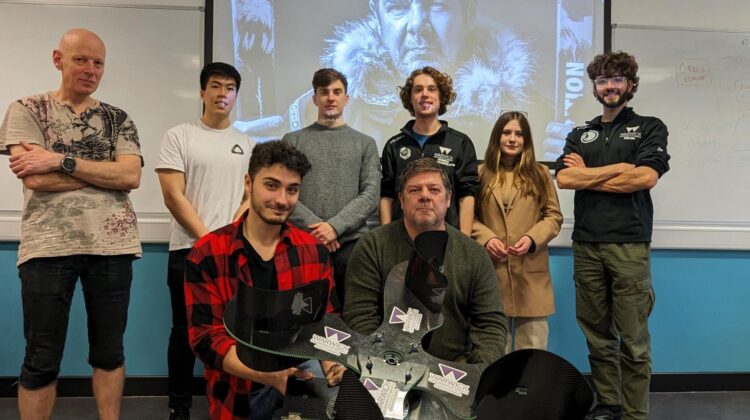
A team of engineering students at the University of Warwick have developed a power source designed to assist in an attempt to create a new world record for the longest continuing solo science-based expedition trip across the Arctic.
Coventry-born Mark Wood (pictured above receiving the device) is planning to cross more than 2,000 kilometres of Arctic tundra during his 100-day ‘Solo 100’ expedition, which is due to begin soon. In doing so, he would set a new world record. Mark aims to use the expedition to highlight the impact of climate change and rising temperatures on the delicate Arctic ecosystem.
Six Warwick students are helping Mark on his journey, having designed and created a power system for him that will keep his cameras, video recorders and satellite phone charged over the 100-day trek.
‘It’s been a real challenge to create a power system that can charge all of Mark’s electronic equipment and is suitable to be used at such low temperatures in remote conditions,’ said Chris Leigh, one of the students who has been involved in designing the device. ‘We decided that wind power was our best option and have spent months refining the design. We’re wishing Mark the best of luck on his expedition.’
The challenges of designing a working system to power batteries in Arctic conditions are complex. Options such as solar panels aren’t suitable because electronic complications from the freezing temperatures, which can dip to –40°C.
The power system is made of carbon fibre and aluminium alloys and operates like a wind turbine. Mark will be able to set it up at night while he sleeps, placing it just outside his tent, with the devices that need to be charged then plugged in and placed inside his sleeping bag to make sure they don’t freeze overnight.
Weight was a significant consideration, as Mark will be pulling a 185-kilgram sled. The system weighs just over two kilograms and folds down flat.
‘This is the longest solo science-based expedition of all time, and this technology from Warwick’s students is integral to it, said Mark, who is a veteran explorer, having previously led expeditions to the Himalaya, Antarctica and the Arctic. ‘To maintain electrical power over more than three months, in some of the worst weather conditions in the world, is previously unheard of. I hope Solo 100 can highlight the environmental damage we’re doing to the Arctic and inspire the next generation of adventurers and conservationists.’



